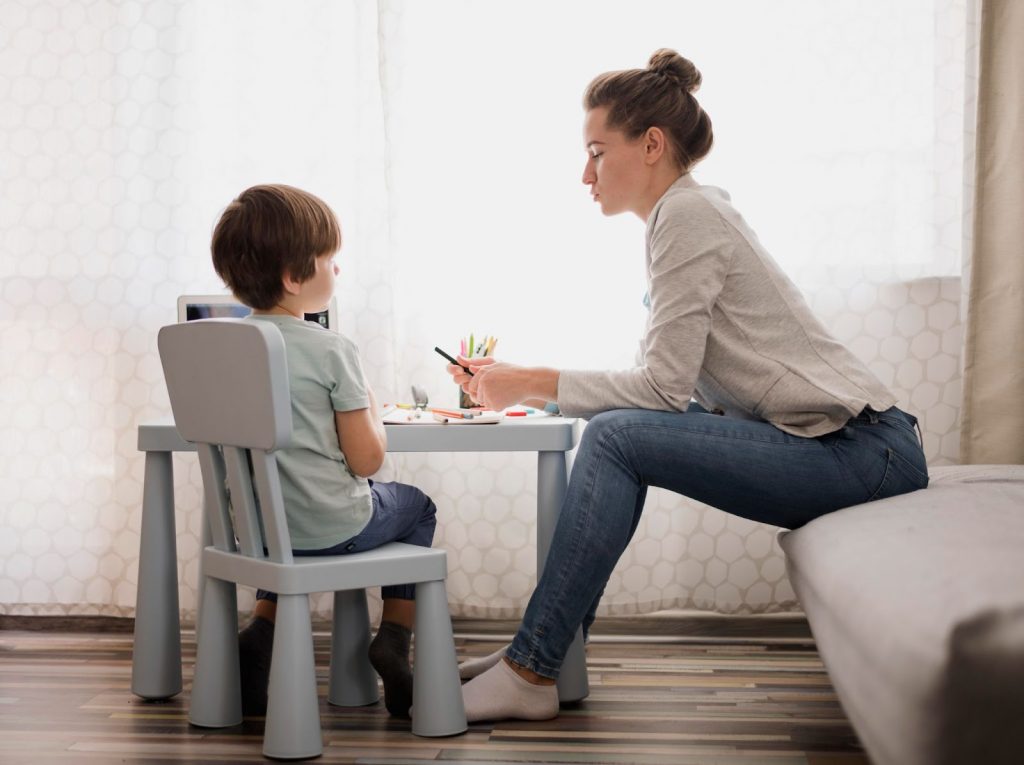Every time the summer break comes to an end, it’s like waving goodbye to those carefree days for my child, and a wave of anxiety takes over. As a parent, this truly worries me. Maybe you’ve felt it too – that mixture of excitement and unease as school approaches again. We know how important it is to talk about this, so let’s dive into a topic that touches the heart of every parent and student: back to school anxiety.
Math & ELA | PreK To Grade 5
Kids see fun.
You see real learning outcomes.
Watch your kids fall in love with math & reading through our scientifically designed curriculum.
Parents, try for free Teachers, use for free
Summer vacations are all about endless play, no homework, and family adventures. It’s when alarm clocks can take a break and laughter echoes in the air. But then the calendar flips, and there it is – the start of school, knocking at the door. Amidst the new notebooks and sharpened pencils, there’s often a sense of uneasiness. It’s like walking into the unknown, and that’s something even adults can relate to.
In the following sections, we’ll talk about those signs that can’t be ignored and deserve our attention. And, most importantly, we’ve got a toolbox of down-to-earth tips – things you can do – to help your child (and you) better handle this rollercoaster of emotions.
Related Reading: Essential Back to School Tips for Parents and Kids
7 Reasons for Back to School Anxiety and Stress

Remember when you were a child? Meeting new teachers, making new friends, facing new challenges – it’s a bundle of emotions that can make your heart race. Well, guess what? Our kids feel it too. Just like how we might feel a bit jittery before a big event or a new job, our kids experience something similar when heading back to school. It’s not just about the backpacks and textbooks; there’s a whole bunch of reasons behind those knots in their stomachs. It’s a natural reaction, but it’s important we help them navigate through it. Together, let’s explore why this happens.
“The only thing we have to fear is fear itself.” – Franklin D. Roosevelt
- New Routines, Goodbye Freedom: Remember those mornings when you didn’t need to rush? Back to school means setting alarms, packing lunches, and hurrying to catch the bus. Goodbye, lazy mornings. Hello, schedule.
- The Pressure to Perform: School isn’t all fun and games. There’s homework, tests, and grades that matter. The thought of living up to expectations can make anyone feel jittery.
- Friends and Fitting In: Making friends can be like solving a puzzle. Back to school may mean new classmates or old ones have changed. It’s natural to worry about fitting in and finding your spot.
- The Unknown Territory: New teachers, new subjects – like stepping into uncharted territory. Who’s your teacher? Will the subjects be too hard? These questions can brew up a storm in your head.
- Saying Bye to Summer: Summer is freedom. Back to school is back to rules. The fun times end, and bidding farewell to relaxation can be a tough pill to swallow.
- Family Separation: For some, summer is all about family bonding. Going back to school means being away from family for hours. That separation can tug at the heart.
- Social Media Pressure: In a world of likes and shares, there’s often pressure to show off the coolest summer stories. The fear of not having a ‘cool’ story can add to the anxiety.
So there you have it, a bunch of reasons why back to school might bring in a storm of feelings. You’re not alone in this. It’s a rollercoaster we all ride at some point, and the best part is you can handle it – step by step. Remember, embracing some back-to-school organizing tips can make this journey smoother for you and your child.
Related Reading: Exciting Back to School Activities for Kids of Different Grades
How to Deal with Back to School Anxiety- 8 Tips

The first day of school arrives, and suddenly your stomach feels like a bunch of butterflies and decides to host a dance party. It’s like your mind is trying to decide between excitement and nervousness, and it’s a tough choice. According to an article on PBS Parents, “Feelings of anxiety are perfectly normal and to be expected during times of transition… It’s not easy to walk into a new classroom with a new teacher and start from scratch every single year”
“It’s not the load that breaks you down, it’s the way you carry it.” – Lou Holtz
From kids who love school to those who’d rather be elsewhere, we’ve collected some real-life tricks that work. These are not magic potions or secret spells, just honest tips for journeying from “what if” to “I’ve got this.” Let’s explore how to help a child with anxiety about school:
1. Start Preparing Ahead
As your child gears up for school, encourage them to start the transition gently. Gradually adjust their bedtime earlier and wake them closer to school hours. This gradual shift can make the back-to-school routine feel smoother.
2. Calm in Your Pocket
How to deal with school anxiety? When anxiety knocks, have some tricks up your sleeve. Teach them deep breathing exercises – inhaling for four counts, exhaling for four counts. Suggest finding a quiet space for short breaks, where they can recharge. Engaging in hobbies like drawing or listening to music can also be helpful.
3. Look at the Positives
While school isn’t all fun and games, help your child find the silver lining. Encourage them to think about what they enjoy – whether it’s a favorite subject, a kind teacher, or social time with friends during lunch. Redirecting their attention to positive aspects can alleviate some of the stress.
4. Make a Road Map
Imagine you’re on a journey with a map. That’s what planning does for school tasks. Break big tasks into smaller steps; suddenly, it’s manageable. Collaborate with your child to break down larger assignments into manageable steps. Crossing off each step can provide a sense of accomplishment and motivation.
5. Speak to a Friend
Friends are like your support squad. Chances are, they’re feeling anxious too. Encourage your child to talk about their worries with their friends. Chances are, their peers are experiencing similar feelings. By sharing their concerns, they’ll realize they’re not alone, and together, they can tackle challenges.
6. Healthy Lifestyle, Healthy Mind
Basic habits like eating well, staying hydrated, and getting enough sleep are powerful tools against anxiety. A nourished body equips your child to handle stress more effectively, promoting a healthier state of mind.
7. Speak to Someone
When worries accumulate like unread messages, let your child know they can confide in someone. Be it you, their friends, or a teacher, these individuals have experienced similar emotions. Sharing their feelings can provide relief and lighten their emotional load.
8. Stay Curious
School is about learning, right? Encourage them to view their worries as opportunities for growth. Each challenge they face becomes a chance to become stronger and wiser as they navigate their academic journey.
Related Reading: Calming Strategies for Kids Every Parent Should Know
10 Signs of Back to School Anxiety

Apprehension the night before the first day of school is normal. New experiences — away from parents, siblings, and other loved ones — can be frightening for children, even if it’s not their first time going to school. Sources of school-related anxiety can be anything from separation anxiety, to the fear of the unknown, to a challenging teacher or assignment, to bullying. ‘You know your child’s behavior and mood best,’ says Northwestern Medicine Therapist Allison Kranich, MS, LCPC, CAADC. ‘Back-to-school anxiety is typical. But each child will present signs differently.'” Here’s a set of questions to help you figure out if back to school anxiety might be paying you a visit:
- How’s Your Sleep: Have you been having trouble falling or staying asleep? Do school-related thoughts keep you up at night?
- How’s Your Mood: Have you been feeling more easily annoyed or upset? Do little things bother you more than usual?
- How’s Your Body: Have you noticed headaches, stomachaches, muscle tension, or other physical discomforts? Do these feelings pop up more when you think about school?
- How’s Your Approach: Do you find yourself avoiding conversations or situations related to school? Do you get nervous even thinking about going back?
- How’s Your Focus: Are you having difficulty concentrating on tasks? Do you find it challenging to make decisions, even about simple things?
- How’s Your Mind Racing: Are your thoughts jumping around like a hyper rabbit? Do they often come back to worries about school?
- How’s Your Appetite: Has your eating pattern changed? Are you eating more or less than usual? Does food seem less appealing?
- How’s Your Overthinking: Are you getting lost in thoughts, analyzing things repeatedly? Is it hard to quiet your mind?
- How’s Your Restlessness: Do you constantly move, like tapping your foot or fidgeting? Do you feel like you can’t sit still?
- How’s Your Worry Scale: Are worries about school constantly on your mind? Are they becoming more intense and frequent?
Remember, it’s okay if you’re experiencing these things. Identifying these signs is like having a flashlight in a dark room – it helps you understand what’s happening. And guess what? There’s help available to make things better. Let’s determine when it’s the right time to ask for that help.
Related Reading: How to Prepare Kids for the First Day of School: 6 Effective Ways
When to Seek Additional Help

“You gain strength, courage, and confidence by every experience in which you really stop to look fear in the face.” – Eleanor Roosevelt
It’s natural to worry about your child’s well-being, especially when it comes to their anxiety about going back to school. While some level of nervousness is common, there are signs that can help you determine if your child’s anxiety might need extra attention. Here’s a guide to recognize when it might be a good time to seek additional help:
- If your child’s anxiety seems to be really intense and continues for a long time, such as weeks or even months, it could be more than just usual back-to-school jitters. If their anxiety is consistently high, seeking support is a proactive step.
- Anxiety can manifest in physical ways. If your child frequently complains of stomachaches, headaches, trouble sleeping, or shows signs like shaking or restlessness due to anxiety, it’s worth considering professional help.
- If your child is actively avoiding going to school, skipping classes, or refraining from participating in activities they once enjoyed because of their anxiety, it’s an indicator that their anxiety might be causing significant distress.
- A sudden drop in grades or a noticeable change in your child’s school performance linked to their anxiety is a signal that their ability to focus on studies is being affected. Seeking help can provide strategies to address this.
- If your child appears overwhelmed by their worries and is struggling to cope, reaching out for assistance is a positive step toward helping them feel more at ease. A professional can equip both you and your child with effective anxiety management techniques.
Who Can You Turn To?
There are professionals who specialize in helping children with anxiety and other mental health concerns. School counselors, teachers your child trusts, pediatricians, or mental health experts are resources you can tap into. These experts can lend an empathetic ear, provide guidance, and offer strategies to help your child navigate their anxiety.
Remember, seeking help for your child’s anxiety demonstrates your commitment to their well-being. It’s an act of strength to recognize when additional support is needed, and doing so can contribute positively to your child’s emotional growth and development.
Conclusion
As we wrap up our journey through back to school anxiety, remember this: feeling nervous about going back to school, and you’re not alone. Starting school after a break can be like riding a rollercoaster of emotions – excitement mixed with a touch of uncertainty.
You’ve learned how to spot the signs of anxiety and have a toolbox of practical tips to help you manage it. But if those signs start feeling too big to handle, don’t hesitate to reach out for support. You’ve got a team of people who care about you and are ready to help you navigate these waters.
So, as you step back into the school routine, know that you’re equipped with knowledge and strategies to make this journey smoother. Embrace the adventure, learn from the challenges, and remember that you can face whatever comes your way. Here’s to conquering anxiety about going back to school after break, one step at a time!
Related Reading: Math Anxiety: How to Overcome and Unlock Your Potential
Frequently Asked Questions (FAQs)
Is it normal to have anxiety about school?
Absolutely! Feeling scared to go back to school is a common experience for many students. School is a big part of life, and it’s natural to have some jitters about it.
Should I force my anxious child to attend school?
Forcing isn’t the best approach. It’s essential to address your child’s anxiety with understanding and support. Instead of pushing them, try having open conversations about their worries. Encourage them to take small steps towards attending school while offering them tools to manage their anxiety. Gradually helping them face their fears can be more effective than forcing them into uncomfortable situations.
How long does school anxiety last?
Fear of going back to school can vary from person to person. For some, it might be a passing phase that lasts a few days or weeks as they adjust to the new routine. For others, it might linger longer. Paying attention to the signs and how they impact your daily life is essential. Suppose the anxiety seems to be sticking around and affecting your well-being for an extended period. In that case, seeking additional help from a trusted adult or professional might be a good idea.









